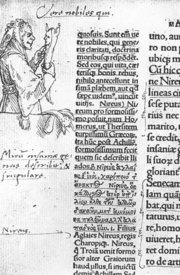 Introduction
Introduction
Overview of Erasmus' "The Praise of Folly"
By Krista Dowdeswell and Jasmine Shantz
 Introduction
Introduction
1. Folly says that her appearance makes her welcome.
2. Her garb is explained by her purpose.
3. It is proper for Folly to praise herself because she knows herself best, it is more modest than hiring a publicity agent, and it is good to praise yourself when no one else will.
4. Her speech is unprepared but genuine.
5. She is as she appears and is recognizable in people even when they try to hide her.
6. She will copy the style of rhetoricians (sprinkling in a few Greek words here and there).
Main Body
1. Folly is great because of her ancestry and birth.
She is the child of Youth and Plutus (the greatest of all gods).
2. Folly is great because of her birthplace and early upbringing.
She was born in the Fortunate Isles and nursed by Drunkenness and Ignorance.
3. Folly is great because of her distinguished attendants.
Her attendants include Drunkenness, Ignorance, Self-Love, Flattery, Forgetfulness, Laziness, Pleasure, Madness, Wantonness, Intemperance, and Sleep.
4. She has great power over humanity.
Happiness depends on her. Men find it in women (who are fools). Friendship/marriage need folly to survive.
5. All great actions depend upon Folly and her companions.
War, civil society and the arts are all founded on foolishness.
6. Folly gives true prudence.
Real prudence is rash behavior and requires buying into the world's comedy (playing the part you are given).
7. Folly brings true wisdom.
Without folly, wisdom would lead to suicide (life would be unbearable, old age intolerable, and shame overwhelming).
8. To be foolish is to be happy.
Men are, by nature, fools. Knowledge of science does NOT increase happiness. Undisciplined animals are the happiest animals. Fools are the happiest of men.
9. To be mad or deluded is not necessarily bad.
There are many kinds of madness - some harmless and pleasurable. Self-love pleases all. Flattery, also, is an admirable form of delusion (it is kindness with good effects). The really sad thing is not to be deceived.
10. Folly is greater than all the other gods.
Worshipped in all places, men are her living temples. People may worship the images of the Virgin and the saints, but they imitate Folly and her teachings.
11. All people are followers of Folly.
The "wise" are included among her devotees including: grammarians, poets, rhetoricians, authors, lawyers, logicians, sophists, scientists, theologians*, monks, kings, courtiers, bishops, cardinals, popes, priests.
12. To be foolish is to be fortunate.
The classics and proverbs speak of this. It is not any easier for a wise man to become wealthy than a fool. Foolish men are more attractive to women. Truly wise men shun fortune/money.
13. Great authorities exalt Folly.
Folly is praised by the proverbs, philosophers, and sacred writers. Jesus, also, speaks of His foolishness. Christ favors the foolish of the world. We know that wisdom was not intended for men because the Tree of Knowledge was forbidden.
14. Christianity is folly.
The church is full of fools. Its founders were enemies of learning. Zealous Christians are notorious fools. The ultimate happiness sought by Christians is a kind of madness.
Conclusion
1. Folly makes no summary because she forgets what she has just said.
2. Those devoted to Folly should continue doing as they have done in the past.
Introduction to Desiderius Erasmus
 · lived
from 1466 - 1536
· lived
from 1466 - 1536
· the most significant and influential figure in the Humanist movement
· personally driven by a desire to reform religion and education
· wanted to free Christian life from the abstractions of scholasticism
· wanted to encourage a simpler and undogmatic Christian faith
· writings helped humanism spread throughout most of Western and some of Eastern Europe
· he joined the Reformers in posing issues which encouraged the Protestant Reformation
· stressed the importance of the Scriptures and fathers of the church
· his writings reflect a popular dissatisfaction with the Church
Introduction to Praise of Folly
· best known of Erasmus' works
· satirical, written for the amusement of Thomas More
· first and longest part is straight satire ("Folly" speaks
as herself)
· later Folly is a "front" for Erasmus to speak critically
(theologians included here)
· critical of war, greed, immorality, worldliness of the clergy, ignorance
of the priests, rigid systems of theology, superstition in popular piety, politics
in the Church and general intolerance.
· satirical style allowed Erasmus to accentuate abuses to make them easily
recognizable
· satirical style allowed Erasmus to be bold and unapologetically truthful
with less personal risk
· ridicules men, but never God
· contains all the great themes of Erasmus' thought (humanism, pacifism,
true Christian commitment)
Overview of The Section Regarding Theologians in "Praise of Folly"
Theologians depend upon folly for their happiness.
1. They are happily full of self-love.
2. They use too many newly-invented terms and definitions.
3. They 'play' around with complex questions.
4. They have ridiculous ethical rules.
5. They try (and ultimately fail) to express things better than the apostles
did.
6. They correct and criticize the church fathers.
7. They try to convert unbelievers with their logic rather than their lives.
8. The most pious men are disgusted by them.
9. They believe they uphold the church.
10. They make-up their own pictures of hell and heaven.
11. They don't follow the proper use of grammar and use a language of their
own.
12. They glory in the title of "Our Masters".